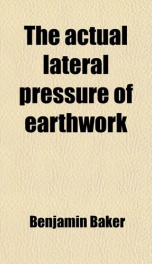the actual lateral pressure of earthwork

Purchase of this book includes free trial access to www.million-books.com where you can read more than a million books for free. This is an OCR edition with typos. Excerpt from book: ratio of 1: A/J, and a h d a parabolic curve. SK 100 For earthwork and masonry of the same weight per cubic foot the equation for stability is : hi A. -=tan2 i angle. Hence, the required thickness () in terms of the height (//) will be ti J tan angle, which is represented on the diagram by ihe line ag; and the "equivalent fluid pressure " in terms of that of a cubic foot earthwork will be=tan2 3 angle, which is represented by the parabolic curve ah d. Thus, if it were required to know the lateral pressure per square foot of earthwork, having a slope of repose of 1£: 1, and the thickness of rectangular vertical wall which, when turning over on its outside edge would just balance that pressure, it would merely be necessary to draw the line c f at the given slope of 1£: 1 and the line c e bisecting the angle a c k, when the line e h would give the equivalent fluid pressure in terms of that of a cubic foot of the earth=28.7 per cent., and the line e i the thickness of the rectangular wall in terms of the height=31 per cent, the weight of masonry being the same as that of the earth. Common stocks in mortar and ballast backing each weigh about 100 Ibs. per cubic foot, hence, on the preceding hypothesis, the pressure acting on the wall would be the same as that due to a fluid weighing 28.7 Ibs. per cubic foot. If, as is usually the case, the masonry be heavier than the earthwork, the required thickness of wall would be reduced in inverse proportion to the square root of the respective weights, so that should the masonry weigh 10 per cent. more than the ballast, the thickness would be about 5 per cent. less than before, or, say, 29.5 per cent. of the height. For other slopes of repose the equivalent fluid pressure and thickness of wall for materials of equ...
Info about the book
Author:
Series:
Unknown
ASIN:
055487797X
Rating:
4.5/5 (4)Your rating:
0/5
Languge:
English
Users who have this book
Users who want this book
What readers are saying
What do you think? Write your own comment on this book!
write a commentif you like the actual lateral pressure of earthwork try:
Other books by this author
Do you want to read a book that interests you? It’s EASY!
Create an account and send a request for reading to other users on the Webpage of the book!


